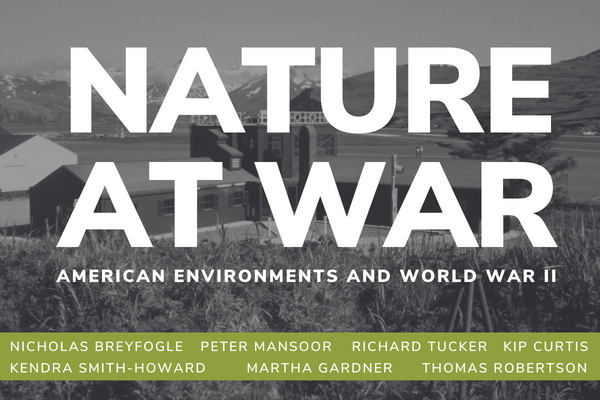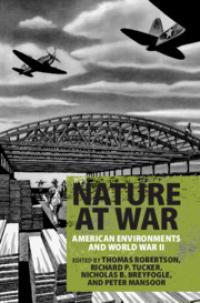
World War II was the most destructive war in human history, and its impact on the environment transformed American lands, waters, ecologies, and communities. The war created or significantly expanded a number of industries, put land to new uses, spurred urbanization, transformed agriculture, and left a legacy of pollution and toxicity that would take decades to rectify. Join us as the editors of the recently published Nature at War: American Environments and World War II discuss their work in exploring the impact of World War II on the United States and its environment.
About the Book

This anthology is the first sustained examination of American involvement in World War II through an environmental lens. World War II was a total and global war that involved the extraction, processing, and use of vast quantities of natural resources. The wartime military-industrial complex, the 'Arsenal of Democracy,' experienced tremendous economic growth and technological development, employing resources at a higher intensity than ever before. The war years witnessed transformations in American agriculture; the proliferation of militarized landscapes; the popularization of chemical and pharmaceutical products; a rapid increase in energy consumption and the development of nuclear energy; a remaking of the nation's transportation networks; a shift in population toward the Sunbelt and the West Coast; a vast expansion in the federal government, in conjunction with industrial firms; and the emergence of environmentalism. World War II represented a quantitative and qualitative leap in resource use, with lasting implications for American government, science, society, health, and ecology.
Purchase at Cambrige University Press
Panel
Nick Breyfogle is Associate Professor of History and Director of the Harvey Goldberg Center for Excellence in Teaching. He is a specialist in the history of Russia/Soviet Union and in global environmental and water history.
Peter Mansoor, Colonel, U.S. Army (Retired), is the General Raymond E. Mason Jr. Chair of Military History and a frequent media commentator on national security affairs. He assumed this position in September 2008 after a 26-year career in the U.S. Army.
Kip Curtis is Associate Professor of History and specializes in Environmental History and Studies with research and teaching foci on mining, environmental ideas, and food systems. He teaches undergraduate and graduate courses in modern United States history and environmental history and offers independent studies in environmental history and the environmental studies and sciences.
Richard Tucker is Professor Emeritus at Oakland University. He has a Ph.D. from Harvard University, specializing in Asian and Environmental History. He has co-edited several books, including Natural Enemy, Natural Ally, Insatiable Appetite, and World Deforestation in the Twentieth Century.
Kendra Smith-Howard is Associate Professor of History at University of Albany, State University of New York and an environmental historian with a focus on twentieth-century United States. Her research interests lie in the intersection of agriculture, consumer culture, technology, and public health. Her research aims to provide a comprehensive understanding of the histories of the environment, agriculture, rural life, public health, and consumer culture, with a particular focus on the late nineteenth and twentieth-century United States.
Martha Gardner is Associate Professor at of History and Social Sciences at the Massachusetts College of Pharmacy and Health Sciences. She authored “Battling Insets and Infection: American Chemical and Pharmaceutical Expansion during World War II”
Tom Robertson is an environmental historian and social scientist who studies international development, particularly its environmental dimensions, usually from an "environmental justice" perspective. He has over two decades of on-the-ground experience, mostly in Asia.
